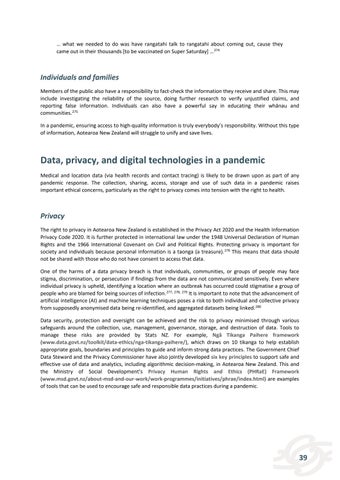… what we needed to do was have rangatahi talk to rangatahi about coming out, cause they came out in their thousands [to be vaccinated on Super Saturday] … 274
Individuals and families Members of the public also have a responsibility to fact-check the information they receive and share. This may include investigating the reliability of the source, doing further research to verify unjustified claims, and reporting false information. Individuals can also have a powerful say in educating their whānau and communities. 275 In a pandemic, ensuring access to high-quality information is truly everybody’s responsibility. Without this type of information, Aotearoa New Zealand will struggle to unify and save lives.
Data, privacy, and digital technologies in a pandemic Medical and location data (via health records and contact tracing) is likely to be drawn upon as part of any pandemic response. The collection, sharing, access, storage and use of such data in a pandemic raises important ethical concerns, particularly as the right to privacy comes into tension with the right to health.
Privacy The right to privacy in Aotearoa New Zealand is established in the Privacy Act 2020 and the Health Information Privacy Code 2020. It is further protected in international law under the 1948 Universal Declaration of Human Rights and the 1966 International Covenant on Civil and Political Rights. Protecting privacy is important for society and individuals because personal information is a taonga (a treasure). 276 This means that data should not be shared with those who do not have consent to access that data. One of the harms of a data privacy breach is that individuals, communities, or groups of people may face stigma, discrimination, or persecution if findings from the data are not communicated sensitively. Even where individual privacy is upheld, identifying a location where an outbreak has occurred could stigmatise a group of people who are blamed for being sources of infection. 277, 278, 279 It is important to note that the advancement of artificial intelligence (AI) and machine learning techniques poses a risk to both individual and collective privacy from supposedly anonymised data being re-identified, and aggregated datasets being linked. 280 Data security, protection and oversight can be achieved and the risk to privacy minimised through various safeguards around the collection, use, management, governance, storage, and destruction of data. Tools to manage these risks are provided by Stats NZ. For example, Ngā Tikanga Paihere framework (www.data.govt.nz/toolkit/data-ethics/nga-tikanga-paihere/), which draws on 10 tikanga to help establish appropriate goals, boundaries and principles to guide and inform strong data practices. The Government Chief Data Steward and the Privacy Commissioner have also jointly developed six key principles to support safe and effective use of data and analytics, including algorithmic decision-making, in Aotearoa New Zealand. This and the Ministry of Social Development’s Privacy Human Rights and Ethics (PHRaE) Framework (www.msd.govt.nz/about-msd-and-our-work/work-programmes/initiatives/phrae/index.html) are examples of tools that can be used to encourage safe and responsible data practices during a pandemic.
39


